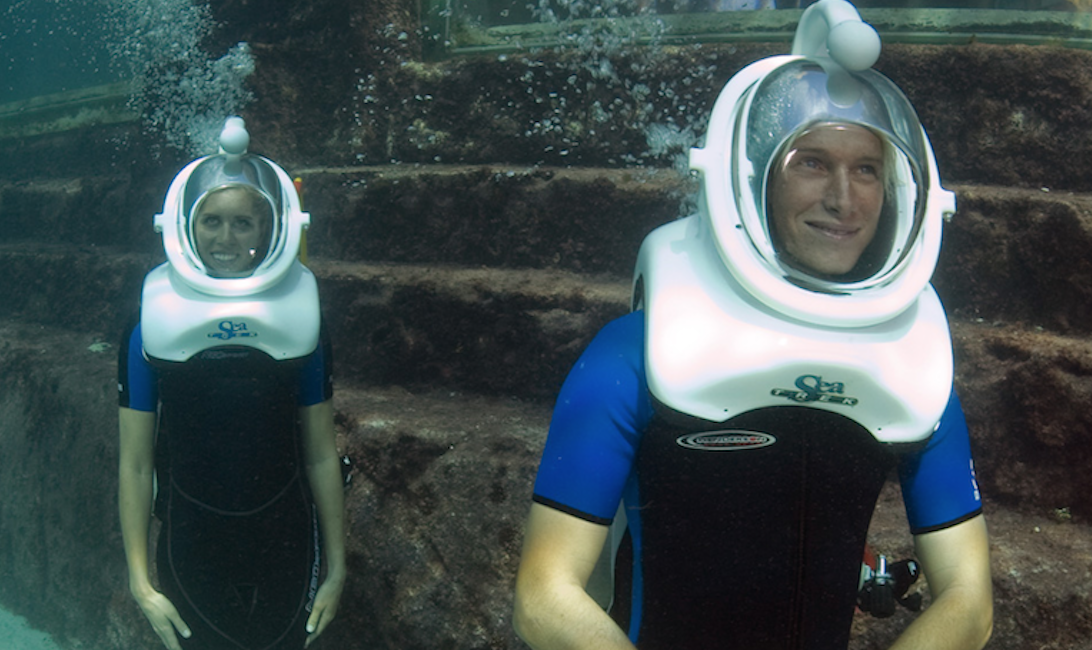At my first real job in high school, I was paid to feed treats to an adorable pair of begging sea otters and was somewhat regularly teased by a large orangutan named Farley. Working at the local zoo was a dream come true. I grew up devouring anything National Geographic or Popular Science, intent to one day become an ethologist—one who studies animal behavior—or to cross the African savannah taking majestic photographs of big game. However, a family trip to the Bahamas quickly shifted my focus from land to sea.
During my vacation, I took a ‘shark walk.’ I was fitted with an awkwardly large helmet and descended slowly into a jumbo-sized aquarium. Upon reaching the bottom, I found that I was transported to a world drastically different from our own. Nurse sharks glided silently around me, sea urchins of vibrant reds, purples, and blues were scattered across the sandy floor, and spiny starfish clung to the walls of the tank, lying relatively motionless. Although I had often visited the ocean as a child, I had never actually been exposed to what lay beneath the rolling waves.
My experience in the shark tank instigated a relentless pursuit toward studying marine science in college. It seemed like a fair compromise with my formerly zoology-focused self: I would still be able to study large charismatic animals, but I would avoid the hot, sticky environment I had found myself in at the zoo. In addition, the oceans seemed far more adventurous to study. I had heard that we knew less about the sea floor than the surface of the moon. By the time college application season rolled around, I was ready to pursue a bachelor’s degree in marine science.
Now, I would be lying if I said I entered college with unwavering confidence in my choice of degree. From time to time, I questioned whether a major in oceanography would be too specific. I even declared myself as an international business student during my senior year in high school —a degree that seemed more promising.
In the end, however, I stuck with my gut and my passion. I had much to learn about what both marine science and STEM truly entailed. But, in hindsight, I am glad I didn’t give up based on premature assumptions of what I thought these areas could be.
Entering college, I envisioned a curriculum and future career that traversed the open seas, unraveling the mysteries of critters who drifted beneath the ocean surface. This dream came about a year before I discovered how brutally prone I am to sea-sickness, but we can save that story for another time. After a few weeks in the program, I discovered how much more depth there was to my field: we would be learning about ocean physics, chemistry, and geology much more so than biology, with some advanced mathematics, tossed in along the way. As someone who thoroughly enjoyed math and physics in high school, I was thrilled. I had anticipated giving up many of these fundamental STEM subjects in pursuit of becoming a sea-going explorer but was excited to learn that I didn’t have to.
My path to STEM was entirely unique, just as yours will be. I could never have planned the specifics in advance. What was important was that I stuck to my gut and followed my passion; everything laid itself out as I went along. I think it is important to not be afraid of having somewhat ‘silly’ reasoning for a major or to have eccentric career dreams. I shied away from zoology because the oceans were not as hot and sticky as the zoo, and I was driven to become a proper National Geographic explorer who took pictures of animals around the world. As I immersed myself in my STEM major, my naïve notion of zoology developed into a more mature understanding of my strengths as a scientist. For my dream of an animal photographer – well, somebody is out there doing that career, so there is an avenue for it! I am now a Ph.D. student in climate science and am still in awe that I can say it’s my job. It is important to not put a career on a pedestal as if it is some unreachable place; someone has to do it, and that someone can be you.




